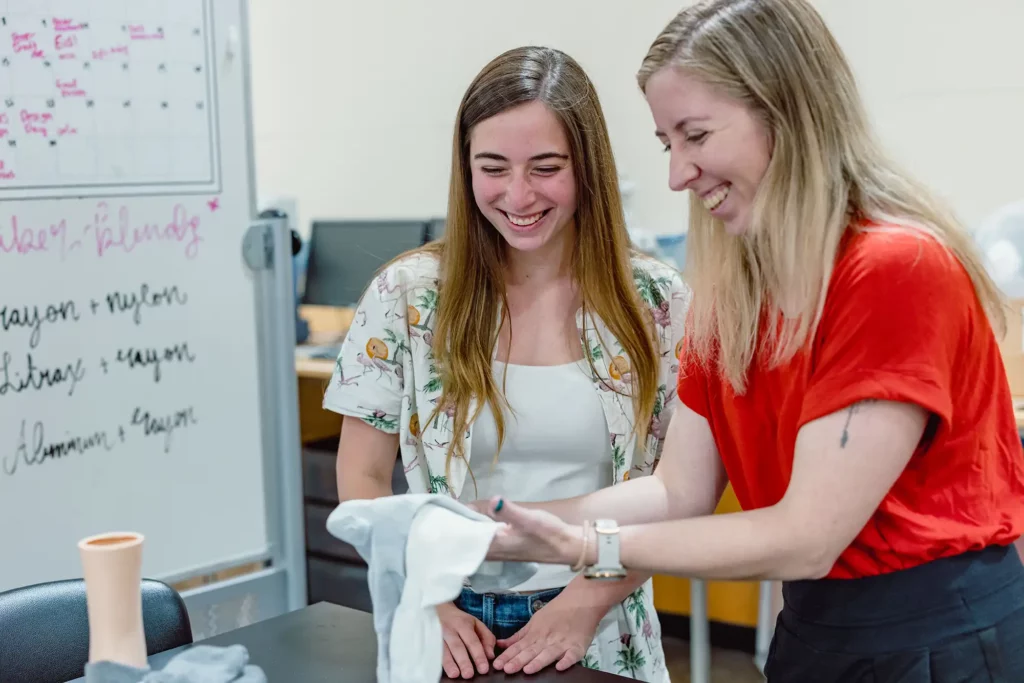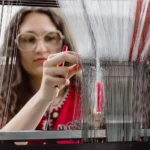The NC textiles industry is at the forefront of innovation and sustainability, offering endless opportunities for professionals seeking a fulfilling career. At Textiles NC, we provide customized training programs, career counseling, and networking opportunities to help you succeed in this dynamic field.
Whether you’re exploring a career in textiles or seeking to advance within the industry, Textiles NC offers a clear pathway to success.
Here’s why our NC textiles programs are the top choice for professionals:

Our training programs cover a broad spectrum of textile topics, from foundational concepts to advanced technology and management. With a mix of theoretical knowledge and practical skills, you’ll be prepared to excel in any textile-related career.

We offer a variety of courses designed to meet the unique needs of professionals. From introductory sessions to specialized workshops, you can find the perfect fit for your career goals.

Our instructors are experienced industry professionals and academics who bring real-world expertise into the classroom. Learn from the best and stay ahead of the latest trends.
The Textiles NC Education Pathway begins with customized training and non-credit courses, then progresses to apprenticeships, certificates, and associate degrees. Ultimately, it leads to advanced degrees in textile technology and related fields, showcasing a clear career trajectory for those seeking to excel in the textile industry. With such a broad range of courses and a clear pathway for advancement, North Carolina State University offers an unparalleled opportunity for individuals looking to establish or further their careers in textiles. Whether you’re interested in learning about textile fundamentals or pursuing an advanced degree, the course catalog provides the resources and guidance you need.
The Textile Technology program at NC State University prepares graduates to excel in a variety of roles within the textile industry.
Here’s how these learning outcomes translate into career success for graduates:

Graduates will use their knowledge of polymer and fiber science, textile technology, and management science to tackle industry challenges in manufacturing, product development, and research.

Success in textiles requires clear communication and teamwork. Graduates who can articulate ideas and collaborate effectively in professional settings will have an edge in various roles.

Innovation in textiles demands critical thinking and creativity. Graduates who possess these skills can contribute to the development of new products, technologies, and processes.

: The textile industry involves cross-functional teams. Graduates who can work well in multidisciplinary environments will be poised for success.
For those in the college transfer program to the North Carolina State University Textile Technology program, be sure to consult with an academic advisor to ensure a smooth transition and maximize your educational opportunities.
The Master of Textiles program is tailored to meet the needs of both seasoned industry professionals and emerging talents.
North Carolina is experiencing a textile industry renaissance, with companies bringing production back to the U.S. Gaston and Lincoln counties, home to large textile manufacturing operations, actively seek qualified graduates. As a result, our program is perfectly positioned to connect you with local employment opportunities.
Our facilities, including the Gaston College Textile Technology Center and the soon-to-be-built Fiber Innovation Center at the Kimbrell campus, offer you access to cutting-edge equipment and labs for hands-on learning. This environment allows you to apply classroom knowledge to real-world scenarios, enhancing your learning experience.
We understand the financial challenges of pursuing higher education. Our program offers financial aid opportunities, including a $2,500/year scholarship for full-time students and a $500 tuition assistance grant for part-time students working in the textile industry. These scholarships can ease your financial burden, allowing you to focus on your studies.
Graduates with an associate degree in Textile Technology are equipped with valuable training and industry-specific skills. Whether you jump straight into the workforce or continue your education, you'll be prepared to meet the demands of the textile industry.
Our NC textiles course catalog is designed to offer a comprehensive range of subjects, providing both foundational knowledge and specialized skills. Here are some of the specific courses that form the backbone of our Textile Technology program:
This course provides an introduction to the textile industry, covering its history, textile materials, and basic manufacturing systems. You'll learn about natural and synthetic fibers, fabric construction, and the key principles of textile technology.
Dive deeper into the science of fibers, focusing on their properties, classifications, and chemical structure. This course explores how fibers react to moisture, stress-strain, and other environmental factors, providing a solid understanding of textile materials.
Learn about the processes involved in yarn manufacturing, including roving, spinning, and twisting. The course covers both long and short staple machinery, giving you a comprehensive view of yarn production.
This course explores the fabric construction process, focusing on weaving techniques and their impact on product performance. You'll learn about different fabric structures, properties, and how they relate to raw materials and production processes.
Understanding the chemical processes involved in dyeing and finishing is crucial for any textile professional. This course covers preparation, dyeing, printing, and finishing for both natural and man-made fabrics, with an emphasis on the chemical nature of dyes and the importance of color fastness.
Ready to take the next step in your textiles career?
At North Carolina State University, we offer the training, resources, and support you need to succeed. Contact us to learn more about our comprehensive course catalog, customized training, and career pathways. We’re here to guide you on your journey to a successful career in textiles.